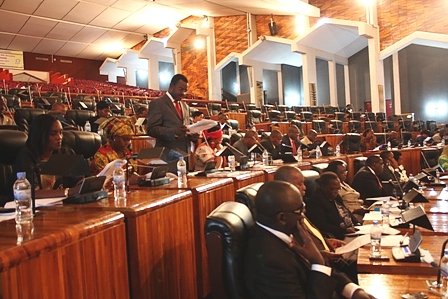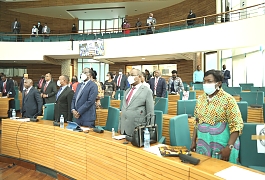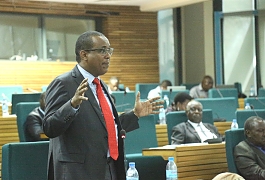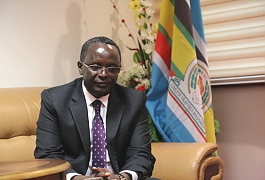Members of the East African Legislative Assembly (EALA) continued deliberations today, debating and adopting a key report of the Accounts Committee. The Report of the Committee on Accounts on Oversight Assessment on Internal Audit Systems of EAC Organs and Institutions was presented to an attentive House by the Chairperson of the Accounts Committee, Hon. Bernard Mulengani.
The Report made public its findings of the recent oversight assessment carried out at the EAC Organs and Institutions including EALA, East African Court of Justice (EACJ), Secretariat and the Lake Victoria Basin Commission.
The objectives of the Oversight function undertaken by the legislators on August 21-26, 2011, were to assess whether the internal auditors of the Community discharge their professional duties, thus recognizing value for money, identify challenges facing internal audit systems of the EAC and to establish the level and uptake of modern auditing techniques and new applied technologies in the discharge of the duties.
The Committee visited the EAC Organs in Arusha, Tanzania and the Lake Victoria Basin Commission (LVBC) in Kisumu, Kenya, where it interacted with the respective management of the Organs and Institutions and reviewed the reports as prepared by the internal auditors.
In its findings, the Committee stated the need for strengthening of the internal audit systems of the EAC by establishing an Audit Risk Committee, adoption of the Audit and Risk Committee Charter and the streamlining of the audit function(s) - to be consistent with international audit standards benchmarks.
“The Committee urges the Council of Ministers to finalise the Charter in order to provide independence to the Internal Audit Unit in line with International Audit standards,” Hon Mulengani said.
The Committee further noted that the capacity of the audit units needed to be strengthened with at least one dedicated internal auditor employed for each Organ and Institution of the Community. To this end, the Assembly urged the Council to lift the freeze on staff recruitment in order to get critical staffing positions filled and enhanced output.
“In the long term, an optimum aspiration is to have a resident Internal audit function in each Organ and Institution of the Community to ensure that separation of powers and sub-accounting status thrives,” the report said in part.
The report thus suggested that where an audit function is placed within the EAC organogram, a review be carried to reflect the importance of the Audit function in the EAC. With that, the Committee suggested the need for the internal audit to be upgraded to directorate level with an independent reporting structure.
At the same time, the Committee called for the streamlining of the procurement procedures at the EAC, which it termed as cumbersome and urged the Secretary General to revise the procedures to enhance efficient performance. In its recommendations to the Assembly, the Committee urged the Secretary General to authorize the procurement policy for EAC organs and institutions for efficiency.
During debate, Members stood up in support of the Report and called for the inculcation of efficient systems and enhanced decision making at the EAC.
The Chairperson of the Council, Hon. Hafsa Mossi hailed the report as comprehensive and pledged to ensure the recommendations were expeditiously undertaken. The Chairperson notified the Assembly that the Council of Ministers would accelerate the finalization of the operational manuals.
The Chairperson further noted that the matter of staff recruitment currently frozen by Council pending completion of the roadmap to include Rwanda and Burundi and the pending institutional review, shall be brought up at a special Council Session to be held soon.
Oversight function is one of the key elements of the mandate of EALA. In terms of oversight, EALA serves to ensure efficiency and effectiveness, fairness and equity in their administration or implementation. Such is done largely through the respective committees of EALA.
Meanwhile, Parliament continues next week on Tuesday, September 13, 2011 at 2.30pm. Five Committees of EALA, the Communication, Trade and Investment (CTI) Committee, Agriculture, Tourism and Natural Resources Committee, Legal, Rules and Privileges Committee, Accounts Committee and the General Purpose Committee shall hold respective meetings, tomorrow Friday and early next week on Monday.
-END-
NOTE TO EDITORS ABOUT EALA
The East African Legislative Assembly is the legislative organ of the East African Community. Its Membership consists of a total of 52, of whom 45 are elected Members (9 from each Partner State) and seven ex-officio members (the Ministers responsible for EAC Affairs from the Partner States, the Secretary General of the Community and the Counsel to the Community).
The East African Legislative Assembly has legislative functions as well as oversight of all East African Community matters. The enactment of legislation of the Community is effected by means of Bills passed by the Assembly and assented to by the Heads of State, and every Bill that has been duly passed and assented to become an Act of the Community and takes precedent over similar legislations in the Partner States.
EALA in June 2010 launched its Strategic Plan and Website at its 5th Meeting of the third Session held in Nairobi and Mombasa, Kenya respectively. The Strategic Plan is expected to go a long way to firmly entrench the EALA as the epitome of the Community’s democracy and unity. The EALA website www.eala.org provides the Assembly with the means to communicate actively with the citizens of East Africa and beyond and enhances public understanding of the legislature’s role and responsibilities.
For more information, contact
Bobi Odiko
Senior Public Relations Officer
East African Legislative Assembly
Tel: +255-27-2508240
Fax: +255-27-2503103
Cell: +255-787-870945
+254-733-718036
Email: BOdiko@eachq.org
Web: https://www.eala.org




